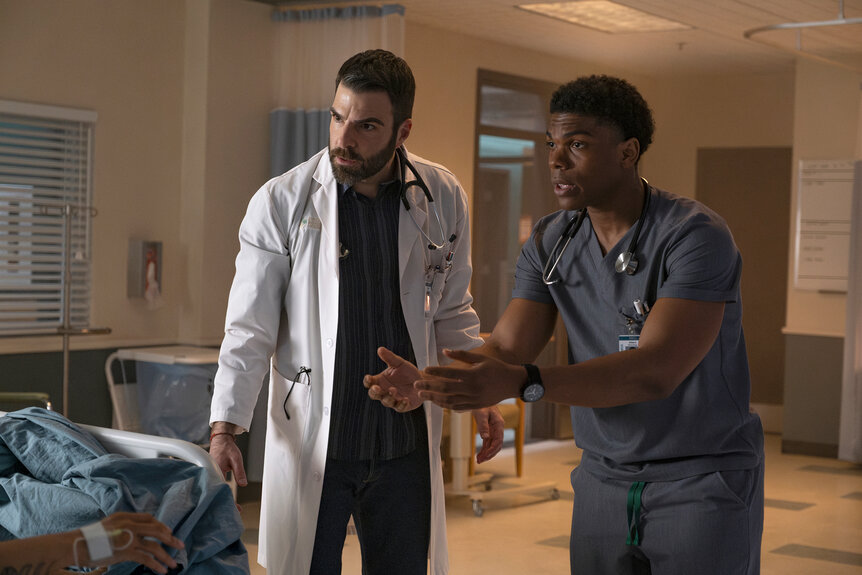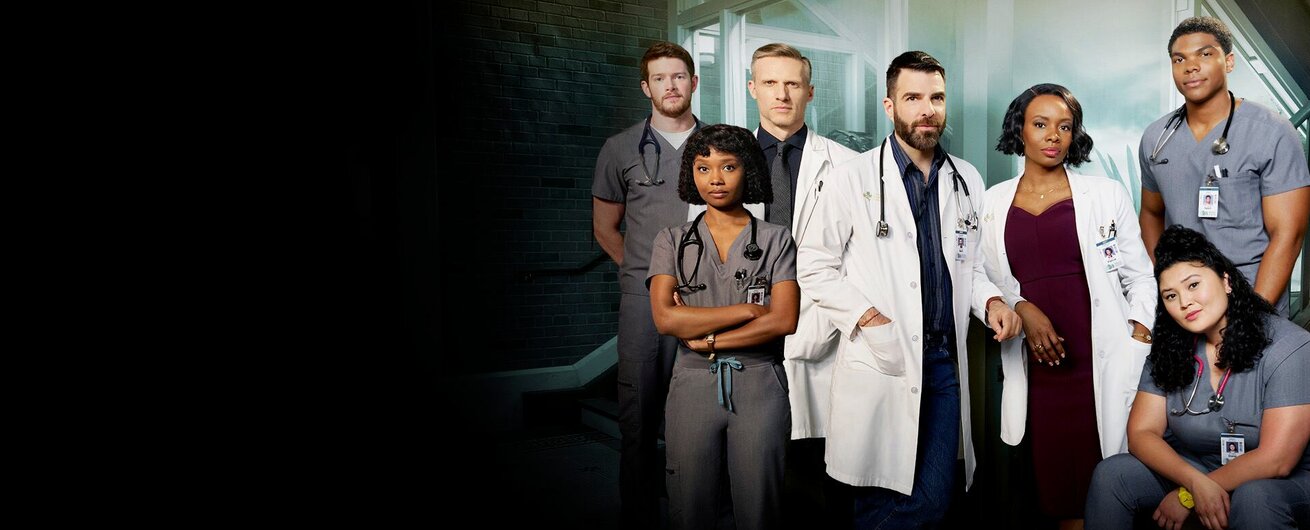A Brilliant Minds Medical Mystery: Exploring "The Disembodied Woman" – aka Proprioceptive Loss
What if you suddenly felt like your body wasn't your own? Literally.

After the series premiere introduced us to Dr. Oliver Wolf (Zachary Quinto) and the unusual neurological ailments he treats, Brilliant Minds is back with another medical mystery in Episode 2, “The Disembodied Woman.”
RELATED: Meet the Brilliant Cast Behind NBC's Medical Drama Brilliant Minds
It centers on Jessie Williams (Nedra Marie Taylor), a prior WNBA star and current coach of a local varsity basketball team. She came in for an elective surgery but opted out at the last minute after a particularly intense nightmare. Soon, she can’t walk, talk, or breathe on her own.
Brilliant Minds Explores Proprioception in Episode 2, "The Disembodied Woman"
In the dream, Williams felt disconnected from her body, unable to control or fully perceive it. She felt disembodied, and the dream stays with her long after she wakes.
“You ever have one of those dreams that feels so real you can’t shake it? It haunts you the rest of the day. This is a hundred times worse. I can still feel it in my body, like something is wrong,” Williams tells Dr. Wolf.
Meanwhile, in the waking world, Williams is losing control. Her entire career — her entire adult life — has involved a high degree of coordination, and now she’s struggling to hold onto small objects, stand, and, eventually, even breathe. She describes her body as feeling dead or as not belonging to her. The nightmare is coming true. Williams is experiencing a profound loss of proprioception, what Dr. Wolf describes as a sixth sense that gives us an awareness of our own body’s position in space.
RELATED: A Brilliant Minds Medical Mystery: Capgras Syndrome Explained
Tests reveal a buildup of B6 (pyridoxine), which may have caused the proprioceptive damage, so they flush her system, but her symptoms get worse. She loses the ability to breathe on her own and has to be ventilated; things are looking increasingly bleak, and no one can figure out how to fix it, or if it can even be fixed. Her muscles work, Williams just has to learn a new way to sense and control them.
"What if she steps outside of herself? What if she uses her other senses to control her body? It's not that her muscles are weak, it's not that she can't breathe, she can,” Dr. Wolf explains. “She just doesn't know it yet because she has to learn to connect with her body in a brand new way."
Little by little, Williams learns to breathe and move her body again using visual cues. Her body has lost the ability to “see” itself, so she learns to use vision and her sense of touch to fill that sensory gap. Williams doesn’t recover her proprioception, but she learns to reconnect with her body in new ways.
Her life has changed fundamentally, but she still has a life.
The Real-Life Story That Inspired “The Disembodied Woman”
The fictional Dr. Wolf, of course, is based on a real-life neurologist, the late Dr. Oliver Sacks. And the loss of proprioception illustrated in “The Disembodied Woman” was also based on an actual patient of his. Sacks wrote about it in his book The Man Who Mistook His Wife For a Hat and Other Clinical Tales in the section titled “The Disembodied Lady.”
Sacks described proprioception, as the fictional Wolf does, as a secret sixth sense that constantly relays to us the positions, tones, and motions of the body’s various parts. He then goes on to describe Christina, a 27-year-old athletic computer programmer who arrived at the hospital for gallbladder removal following the discovery of gallstones. She was admitted to the hospital three days before the operation and put on a preventative course of antibiotics.
Everything was going fine until the day before the surgery when Christina had a dream in which she couldn’t feel the ground and couldn’t control her hands. She asked for a psychological evaluation and was given a mundane diagnosis of pre-operative anxiety. Later that day, just like with her fictional on-screen counterpart, the nightmare came true.
RELATED: Understanding Face Blindness: Seeing Through the Eyes of Brilliant Minds' Dr. Wolf
By the next day, Christina’s symptoms had worsened considerably. She couldn’t stand up unless she watched her feet, and her hands wandered aimlessly unless she was looking at them. Even her voice changed, having lost the innate knowledge of her vocal cords’ position. Tests revealed inflammation of the nerves, but no real cause. The inflammation improved but the nerve damage remained.
As Dr. Sacks explained, our sense of position in space is governed by three systems: vision, the vestibular system of the inner ear, and that inner sense of proprioception. Christina had lost her proprioception and had to learn to orient herself and move her body using only the other two systems. It was slow going at first and began with halting, almost robotic movements. Over time, a sort of muscle memory kicked in and her movements became more fluid.
For the first month she was “floppy as a ragdoll,” according to Sacks. Within a few months, she had a preliminary command of her body again and within a year, she was able to live a somewhat ordinary life. Christina was able to walk and talk again, but always and only with intention, every movement planned and meticulously carried out, nothing ever natural. Worse, psychologically and emotionally, she continued to feel, even years later, that her body wasn’t hers or that it was dead. Her body felt more like a machine she was piloting than anything that was a part of herself.
RELATED: Zachary Quinto & Tamberla Perry Reveal the Real "Longtime" Relationship Behind Brilliant Minds
There were moments when something akin to proprioception returned, Sacks recounts, like when riding in a car with the top down. The full-body external stimuli of the wind rushing past her face, arms, and torso was enough to place Christina momentarily back inside her own skin.
In the postscript to “The Disembodied Lady,” Sacks describes a then-recent discovery of other patients exhibiting similar symptoms. Many of these patients had consumed health supplements in excess and suffered from B6 toxicity. It’s unclear if that was also the cause of Christina’s proprioceptive loss. In real life, sometimes mysteries remain mysteries.
New episodes of Brilliant Minds premiere on Mondays on NBC at 10/9c and are available to stream on Peacock.

















